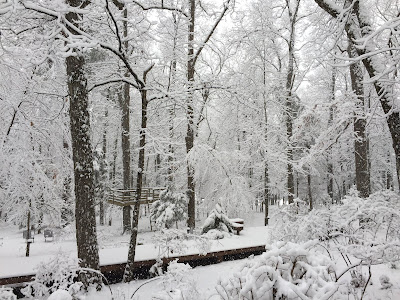 |
| Amanita Jacksonii |
This is a truly beautiful mushroom with a brilliant red cap. They are sprouting all over the woods. It is not poisonous, but some look-a likes are deadly. So we can't eat them! I'm pretty sure I have this labelled correctly, but . . . . this is my first foray into identifying wild mushrooms. I am way beyond my comfort level. I could have gotten them all wrong or all right, no telling. Still, don't you love trying to learn something new? Gills, spots, stalk, cap, bruising, spores--all part of a specialized vocabulary. Plenty of web sites to help.
We've had so much rain in North Carolina that the fungi are exploding. The amount of rain, in fact, is rather alarming. So are the fires in California, the melting ice in Glacier National Park, and the grieving mother Orca holding her dead calf for 17 days and 1,000 miles. It all makes me more than a little nervous. I'm trying to do my part. But the rain has definitely brought it's own beauty. Some friends saw the sprouting mushrooms first when their headlights hit a cluster. Since then I've been spotting them everywhere, in every shape and size. I love it! Look at the one below at 7 inches! And the little thumb-nail sized one. We must have a hundred of those!
 |
| Amanita Jacksonii |
The Amanita Jacksonii is usually solitary, but sometimes occurs in scattered groups. Doesn't that description sound more like an animal than a plant? The Russula, below, is a very complicated genus, with more than 750 species I learned. Wikipedia says that "Russula is mostly free of deadly poisonous species, and mild-tasting ones are all edible." Well, that kind of sounds like I'd have to taste one to know, and that makes me nervous too. I'll have to learn more.
 |
| Russula Mushrooms |
The one below is edible, at least it is if I've identified it correctly. Chicken of the Woods. Obviously tastes like chicken to some people. We have a lot of Chicken of the Woods on fallen trunks and heavy branches.
 |
| Chicken of the Woods |
But the Northern Tooth fungus is not edible. It's a combination shelf and tooth fungus. Since it is a parasite, it causes the central core of a living tree to rot. Then a strong wind will blow the tree over. Not surprisingly I found this fungus on a trunk on the ground.
 |
| Northern Tooth Fungus |
The next one I've nicknamed Pancake. It looks like a stack of these with maple syrup and butter would taste just right. But I'm not going to experiment! It's enough fun just to hunt these out and photograph them. Because we have white-tailed deer, who apparently can eat at least some amount of even a toxic mushroom, the ones around our house keep disappearing after a few days. This too is a subject I'd like to find out more about.
The ugliest mushroom I found is apparently nicknamed Old Man of the Woods. Not sure why old men are the butt here. The ones in my life are as handsome as ever. But here it is. It grows alone on the ground with a layer of woolly scales on the top.
The other treasures in the yard that the rain has helped are the heaps of wild mint and the spreading carpets of moss. Both now come right up to our patios. Wild mint after a rain smells so wonderful.
Chasing down these mushrooms and finding more and more squishy new moss is a silent adventure. So much of nature is noisy--the chattering of the birds, the deafening cicadas, the deer snorting, the boisterous foxes that were under our deck (Post: "Make Your Life a Little Easier, Especially In Your Head"). Finding mushrooms is calming. They're as beautiful as flowers. They grow silently out of matter we often think of as dead--thick layers of fallen leaves. But the natural compost is rich and good. Pico Iyer (b. 1957), British born travel writer, essayist and novelist of Indian descent, says,
It's the open spaces in any life, I suspect--
the moments when you lost yourself--
that make for happiness, peace, and clarity.
Each day, by the time I have taken all the pictures of mushrooms that I want, my body is relaxed and my mind quiet. I've been totally absorbed. My mind isn't trying to be still; it just happens.



































